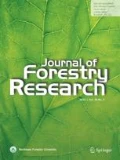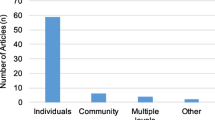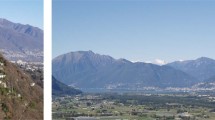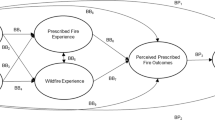Abstract
Wildfire risk related to hazards on people and assets is expected to increase in the face of climate change, especially in fire-prone environments such as the Mediterranean Basin. Distinguishing rationalities, i.e., the complex profile of multi-thematic, wildfire-related perceptions that collectively characterize and quantify all of a society’s responses, its interrelations, and influence on its insights, are of primary importance to understand the degree of preparedness and the direction that wildfire management policies are moving. Greece is a country that suffered mega-wildfire events during the first years of the twenty-first century. This paper presents a scheme of advanced multivariate statistical procedures applied on standard social survey questionnaires to uncover different or similar rationalities between fire management services and the general public. Profession-centered versus message-oriented rationalities is defined. They differ mainly on the priorities attributed to strengthening personnel and equipment capacities versus the need for public education and awareness. Both are evaluated against the needs of long-term risk assessment and forest management policies in Greece. The main conclusion is that Greek society, although traumatized by recent fire disasters, is not yet prepared for long-term strategic forestry adaptation and planning.





Similar content being viewed by others
References
Archibald S, Lehmann CE, Gómez-Dans JL, Bradstock RA (2013) Defining pyromes and global syndromes of fire regimes. Proc Natl Acad Sci 110(16):6442–6447
Asah ST, Guerry AD, Blahna DJ, Lawler JJ (2014) Perception, acquisition and use of ecosystem services: human behavior, and ecosystem management and policy implications. Ecosyst Serv 10:180–186
Bakhshaii A, Johnson EA (2019) A review of a new generation of wildfire–atmosphere modeling. Can J for Res 49(6):565–574
Benayas JR, Martins A, Nicolau JM, Schulz JJ (2007) Abandonment of agricultural land: an overview of drivers and consequences. CAB Rev Perspect Agric Veterinary Sci Nutr Nat Res 2(57):1–14
Buizer M, Kurz T (2016) Too hot to handle: depoliticisation and the discourse of ecological modernisation in fire management debates. Geoforum 68:48–56
Camia A, Durrant T, San-Miguel-Ayanz J (2013) Harmonized Classification Scheme of Fire Causes in the EU Adopted for the European Fire Database of EFFIS. Publications Office of the European Union, Luxembourg, p 51
Christensen W (2008) The prevention of bushfire arson through target hardening. Flinders J Law Reform 10(3):693–713
Cozens P, Christensen W (2011) Environmental criminology and the potential for reducing opportunities for bushfire arson. Crime Prev Community Saf 13(2):119–133
Darren G, Mallery P (2019) IBM SPSS statistics 26 step by step: a simple guide and reference, Sixteenth. Routledge, New York, USA, p 402
De Groot R, Brander L, Van Der Ploeg S, Costanza R, Bernard F, Braat L, Christie M, Crossman N, Ghermandi A, Hein L (2012) Global estimates of the value of ecosystems and their services in monetary units. Ecosyst Serv 1(1):50–61
Díaz S, Demissew S, Carabias J, Joly C, Lonsdale M, Ash N, Larigauderie A, Adhikari JR, Arico S, Báldi A (2015) The IPBES Conceptual Framework—connecting nature and people. Current Opinion Environ Sustainability 14:1–16
Douglas M (1994) Risk and Blame: Essays in Cultural Theory. Routledge, London, UK, p 336
EFFIS (2020) European Forest Fire Information System, Joint Research Centre: Forest Fires in Europe, Middle East and North Africa. European Commission, Publications Office, Luxembourg. https://effis.jrc.ec.europa.eu/. Accessed 11 June 2021
Field A (2013) Discovering statistics using IBM SPSS statistics, 4th edn. SAGE Publications, p 916
Floress K, Huff ES, Snyder SA, Koshollek A, Butler S, Allred SB (2019) Factors associated with family forest owner actions: a vote-count meta-analysis. Landsc Urban Plan 188:19–29
Goldammer J, Xanthopoulos G, Eytixidis G, Mallinis G, Mitsopoulos I, Dimitrakopoulos A (2019) Prospects for the Management of Forest and Landscape Fires in Greece (In Greek). The Global Fire Monitoring Center (GFMC);Secretariat of the Global Wildland Fire Network; UNISDR Wildland Fire Advisory Group; International Wildfire Preparedness Mechanism; International Fire Aviation Working Group, Athens, Greece. 80 p.
Hardy CH (2005) Wildland fire hazard and risk: Problems, definition, and context. Ecol Manag 211:73–82
IPBES (2019) Summary for policymakers of the global assessment report on biodiversity and ecosystem services of the Intergovernmental Science-Policy Platform on Biodiversity and Ecosystem Services. The IPBES global assessment report on biodiversity and ecosystem services: Summary for policy makers. Bonn, Germany. 56
Kalabokidis KD, Gatzojannis S, Galatsidas S (2002) Introducing wildfire into forest management planning: towards a conceptual approach. For Ecol Manage 158(1–3):41–50
Kalabokidis K, Palaiologou P, Gerasopoulos E, Giannakopoulos C, Kostopoulou E, Zerefos C (2015) Effect of climate change projections on forest fire behavior and values-at-risk in southwestern Greece. Forests 6(6):2214–2240
Kline JD, White EM, Fischer AP, Steen-Adams MM, Charnley S, Olsen CS, Spies TA, Bailey JD (2017) Integrating social science into empirical models of coupled human and natural systems. Ecol Soc 22(3):25. https://doi.org/10.5751/ES-09329-220325
Leys B, Higuera PE, McLauchlan KK, Dunnette PV (2016) Wildfires and geochemical change in a subalpine forest over the past six millennia. Environ Res Lett 11(12):125003
Loehman RA (2020) Drivers of wildfire carbon emissions. Nat Clim Change 10:1070–1071
MacDonald D, Crabtree JR, Wiesinger G, Dax T, Stamou N, Fleury P, Gutierrez Lazpita J, Gibon A (2000) Agricultural abandonment in mountain areas of Europe: environmental consequences and policy response. J Environ Manage 59(1):47–69
Maguire LA, Albright EA (2005) Can behavioral decision theory explain risk-averse fire management decisions? For Ecol Manage 211:47–58
Marlon J (2020) What the past can say about the present and future of fire. Quatern Res 96:66–87
Mellon RC, Papanikolau V, Prodromitis G (2009) Locus of control and psychopathology in relation to levels of trauma and loss: Self-reports of Peloponnesian wildfire survivors. J Traum Stress Off Publ Int Soc Traum Stress Studies 22(3):189–196
Moriondo M, Good P, Durao R, Bindi M, Giannakopoulos C, Corte-Real J (2006) Potential impact of climate change on fire risk in the Mediterranean area. Climate Res 31:85–95
Moss RH, Edmonds JA, Hibbard KA, Manning MR, Rose SK, Van Vuuren DP, Carter TR, Emori S, Kainuma M, Kram T (2010) The next generation of scenarios for climate change research and assessment. Nature 463(7282):747–756
Nielsen-Pincus M, Moseley C, Gebert K (2014) Job growth and loss across sectors and time in the western US: the impact of large wildfires. Forest Policy Econ 38:199–206
Oliveira TM, Guiomar N, Baptista FO, Pereira JMC, Claro J (2017) Is Portugal’s forest transition going up in smoke? Land Use Policy 66:214–226
Palaiologou P, Ager AA, Nielsen-Pincus M, Evers C, Kalabokidis K (2018) Using transboundary wildfire exposure assessments to improve fire management programs: a case study in Greece. Int J Wildland Fire 27:501–513
Palaiologou P, Kalabokidis K, Ager AA, Day MA (2020) Development of comprehensive fuel management strategies for reducing wildfire risk in Greece. Forests 11(8):789
Palaiologou P, Kalabokidis K, Ager AA, Galatsidas S, Papalampros L, Day MA (2021a) Spatial optimization and tradeoffs of alternative forest management scenarios in Macedonia. Greece Forests 12(6):697
Palaiologou P, Kalabokidis K, Troumbis AY, Day MA, Nielsen-Pincus M, Ager AA (2021b) Socio-ecological perceptions of wildfire management and effects in Greece. Fire 4(2):18. https://doi.org/10.3390/fire4020018
Papanastasis VP, Kazaklis A (1998) Land Use Changes and Conflicts in the Mediterranean-Type Ecosystems of Western Crete. In: Rundel PW, Montenegro G, Jaksic FM (eds) Landscape Disturbance and Biodiversity in Mediterranean-Type Ecosystems. Springer, Berlin Heidelberg, Berlin, Heidelberg, pp 141–154
Pascual U, Balvanera P, Díaz S, Pataki G, Roth E, Stenseke M, Watson RT, Dessane EB, Islar M, Kelemen E (2017) Valuing nature’s contributions to people: the IPBES approach. Current Opin Environ Sustainability 26:7–16
Pituch KA, Stevens JP (2016) Applied multivariate statistics for the social sciences: Analyses with SAS and IBM’s SPSS, 6th edn. Routledge, New York, USA, p 814
Poljansek K, Casajus Valles A, Marin Ferrer M, De Jager A, Dottori F, Galbusera L, Garcia Puerta B, Giannopoulos G, Girgin S, Hernandez Ceballos MA, Iurlaro G, Karlos V, Krausmann E, Larcher M, Lequarre AS, Theocharidou M, Montero Prieto M, Naumann G, Necci A, Salamon P, Sangiorgi M, Raposo ML, Trueba Alonso C, Tsionis G, Vogt J, Wood M (2019) Recommendations for National Risk Assessment for Disaster Risk Management in EU: Where Science and Policy Meet. JRC Science for Policy Report, European Union, Luxembourg
Psarros C, Theleritis C, Kokras N, Lyrakos D, Koborozos A, Kakabakou O, Tzanoulinos G, Katsiki P, Bergiannaki JD (2018) Personality characteristics and individual factors associated with PTSD in firefighters one month after extended wildfires. Nord J Psychiatry 72(1):17–23
Purnomo H, Shantiko B, Sitorus S, Gunawan H, Achdiawan R, Kartodihardjo H, Dewayani AA (2017) Fire economy and actor network of forest and land fires in Indonesia. Forest Policy Econ 78:21–31
Rius D, Vannière B, Galop D (2012) Holocene history of fire, vegetation and land use from the central Pyrenees (France). Quatern Res 77(1):54–64
Rodriguez-Franco C, Haan TJ (2015) Understanding climate change perceptions, attitudes, and needs of forest service resource managers. J Sustain for 34(5):423–444
Ruane AC, Antle J, Elliott J, Folberth C, Hoogenboom G, Croz DM-D, Müller C, Porter C, Phillips MM, Raymundo RM (2018) Biophysical and economic implications for agriculture of+ 1.5 and+ 2.0 C global warming using AgMIP Coordinated Global and Regional Assessments. Climate Res 76(1):17–39
Sallares R (1991) The ecology of the ancient Greek world. Cornell University Press, Ithaca, New York, p 598
Shindler B, Spies T, Bolte J, Kline J (2017) Integrating ecological and social knowledge: learning from CHANS research. Ecol Soc 22(1):26. https://doi.org/10.5751/ES-08776-220126
Steinführer A (2015) Citizens wanted. Changing roles in the provision of public services in rural areas. Spatial Res Planning 73(1):5–16
St-Laurent GP, Hagerman S, Kozak R (2018) What risks matter? Public views about assisted migration and other climate-adaptive reforestation strategies. Clim Change 151(3):573–587
St-Laurent GP, Hagerman S, Findlater KM, Kozak R (2019) Public trust and knowledge in the context of emerging climate-adaptive forestry policies. J Environ Manage 242:474–486
Sullivan GM, Artino ARJ (2013) Analyzing and interpreting data from Likert-type scales. J Grad Med Educ 5(4):541
Tedim F, Leone V, Coughlan M, Bouillon C, Xanthopoulos G, Royé D, Correia FJ, Ferreira C (2020) Extreme wildfire events: the definition. In: Extreme Wildfire Events and Disasters. Elsevier, pp 3–29
Troumbis AY (2021) Imbalances in attitudes of European citizens towards biodiversity: Did the communication of the European Biodiversity Strategy work? Journal for Nature Conservation (in press)
Troumbis AY, Hatziantoniou MN (2018) Too much, too fast, too complex or too strange? Asymmetric sequences in public opinion regarding biodiversity conservation in Island social-ecological setups. Biodivers Conserv 27(6):1403–1418
Troumbis AY, Zevgolis Y (2020) Biodiversity crime and economic crisis: Hidden mechanisms of misuse of ecosystem goods in Greece. Land Use Policy 99:105061
European Commission (2019a) Special Eurobarometer 481: Attitudes of Europeans towards Biodiversity. European Union. p 18. https://ec.europa.eu/clima/sites/clima/files/support/docs/report_2019_en.pdf. Accessed 11 June 2021
European Commission (2019b) Special Eurobarometer 490: Climate Change. European Union. p 130. https://ec.europa.eu/clima/sites/clima/files/support/docs/report_2019_en.pdf. Accessed 11 June 2021
UNISDR (2009) UNISDR terminology on disaster risk reduction. United Nations International Strategy for Disaster Reduction, Geneva, Switzerland. p 30.
Funding
No funding received for this research.
Author information
Authors and Affiliations
Contributions
AYT, KK and PP are the contributors to this research (from conception to submission).
Corresponding author
Ethics declarations
Conflict of interest
The authors declared that they have no conflicts of interest.
Ethical approval
No ethical issues (experimentation on humans and/or animals) to this work
Additional information
Publisher's Note
Springer Nature remains neutral with regard to jurisdictional claims in published maps and institutional affiliations.
The online version is available at http://www.springerlink.com
Corresponding editor: Yu Lei
Rights and permissions
About this article
Cite this article
Troumbis, A.Y., Kalabokidis, K. & Palaiologou, P. Diverging rationalities between forest fire management services and the general public after the 21st-century mega-fires in Greece. J. For. Res. 33, 553–564 (2022). https://doi.org/10.1007/s11676-021-01371-3
Received:
Accepted:
Published:
Issue Date:
DOI: https://doi.org/10.1007/s11676-021-01371-3




